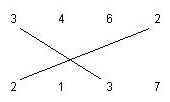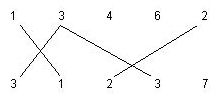POJ 1692 Crossed Matchings(DP)
题意 有两行数a[n1] b[n2] 分别有n1 n2个数 当第一行一个数和第二行一个数相等时 他们就可以连起来 每个数只能连一个 求最有多少条线使得每条都至少有一条和它相交
令d[i][j]表示 a的前i个数和j的前j个数最多可以连接多少条
当a[i]==b[j]时 将们连起来是肯定不与其它线相交的 所以d[i][j]=max(d[i-1][j],d[i][j-1])
当a[i]!=b[j]时 如果可以在第一行找一个数x<i 第二行找一个数y<j 使得a[x]==b[j] b[y]==a[i] 那么有d[i][j]=max(d[x][y]+2,d[i-1][j],d[i][j-1]) 如果找不到d[i][j]=max(d[i-1][j],d[i][j-1])
#include<cstdio>
#include<cstring>
#include<algorithm>
using namespace std;
const int N = 105;
int a[N], b[N], d[N][N], la, lb, cas;
int main()
{
scanf ("%d", &cas);
while (cas--)
{
scanf ("%d%d", &la, &lb);
for (int i = 1; i <= la; ++i)
scanf ("%d", &a[i]);
for (int j = 1; j <= lb; ++j)
scanf ("%d", &b[j]);
for (int i = 1; i <= la; ++i)
for (int j = 1; j <= lb; ++j)
{
d[i][j] = max (d[i][j - 1], d[i - 1][j]);
int x, y;
for (x = i - 1; x >= 1; --x)
if (a[x] == b[j]) break;
for (y = j - 1; y >= 1; --y)
if (a[i] == b[y]) break;
if (x && y && a[i] != b[j])
d[i][j] = max (d[x - 1][y - 1] + 2, d[i][j]);
}
printf ("%d\n", d[la][lb]);
}
return 0;
}
Crossed Matchings
Description
There are two rows of positive integer numbers. We can draw one line segment between any two equal numbers, with values r, if one of them is located in the first row and
the other one is located in the second row. We call this line segment an r-matching segment. The following figure shows a 3-matching and a 2-matching segment.
![]()
We want to find the maximum number of matching segments possible to draw for the given input, such that:
1. Each a-matching segment should cross exactly one b-matching segment, where a != b .
2. No two matching segments can be drawn from a number. For example, the following matchings are not allowed.
![]()
Write a program to compute the maximum number of matching segments for the input data. Note that this number is always even.

We want to find the maximum number of matching segments possible to draw for the given input, such that:
1. Each a-matching segment should cross exactly one b-matching segment, where a != b .
2. No two matching segments can be drawn from a number. For example, the following matchings are not allowed.

Write a program to compute the maximum number of matching segments for the input data. Note that this number is always even.
Input
The first line of the input is the number M, which is the number of test cases (1 <= M <= 10). Each test case has three lines. The first line contains N1 and N2, the number
of integers on the first and the second row respectively. The next line contains N1 integers which are the numbers on the first row. The third line contains N2 integers which are the numbers on the second row. All numbers are positive integers less than 100.
Output
Output should have one separate line for each test case. The maximum number of matching segments for each test case should be written in one separate line.
Sample Input
3
6 6
1 3 1 3 1 3
3 1 3 1 3 1
4 4
1 1 3 3
1 1 3 3
12 11
1 2 3 3 2 4 1 5 1 3 5 10
3 1 2 3 2 4 12 1 5 5 3
Sample Output
6
0
8



 浙公网安备 33010602011771号
浙公网安备 33010602011771号